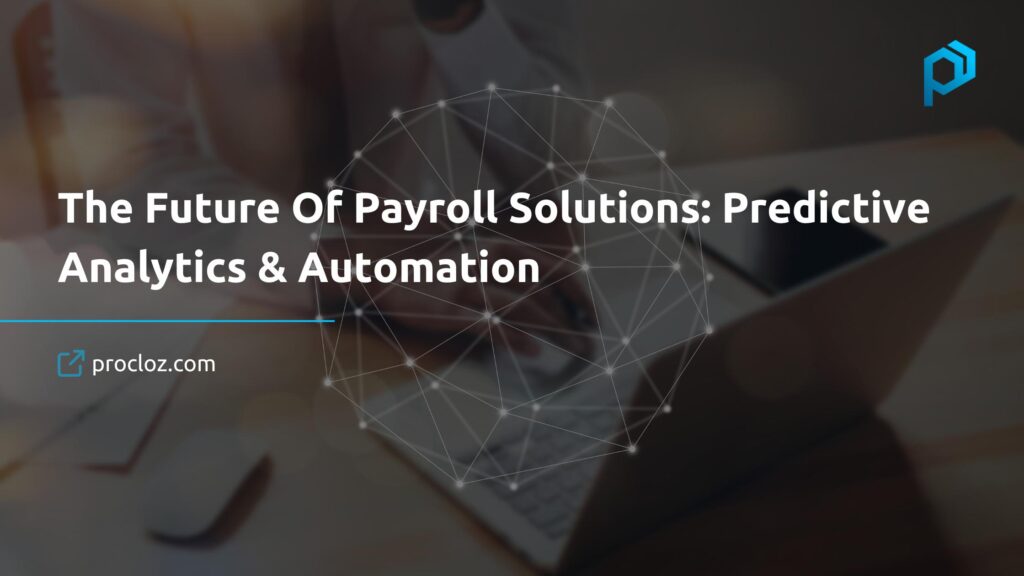The Future Of Payroll Solutions: Predictive Analytics & Automation
Payroll management is an essential function in any organization, ensuring timely and accurate payment to employees. However, traditional payroll processes are often time-consuming, error-prone, and require significant manual effort. With the advancements in technology, predictive analytics, and automation are transforming the future of payroll solutions. By leveraging data-driven insights and streamlining repetitive tasks, these innovations are revolutionizing the payroll process, enhancing efficiency, accuracy, and compliance.
Understanding Predictive Analytics in Payroll Solutions
Predictive analytics involves the use of historical data, statistical algorithms, and machine learning techniques to make predictions about future events or outcomes. In the context of payroll solutions, predictive analytics can analyze vast amounts of data, including employee records, attendance, leave patterns, and performance metrics, to forecast future payroll requirements accurately. These insights enable organizations to proactively manage their workforce, optimize resource allocation, and anticipate potential issues such as labor shortages or surpluses.
By leveraging predictive analytics, payroll professionals can improve the accuracy of their payroll calculations and reduce errors. They can identify patterns and trends, enabling them to forecast future costs, anticipate budgetary requirements, and make informed decisions about compensation and benefits.
Here are some best practices for managing global payroll compliance in multiple countries.
The Role of Automation in Payroll Solutions
Automation plays a vital role in streamlining payroll processes by eliminating manual tasks and reducing administrative burdens. By automating routine activities such as data entry, time tracking, payroll calculations, and tax filings, organizations can significantly reduce the risk of errors and improve operational efficiency.
Payroll automation software can integrate with various systems within an organization, such as HR management systems and time and attendance tracking tools. This integration allows for seamless data flow and eliminates the need for duplicate data entry, ensuring accuracy and saving time. Furthermore, automation can enable employees to access their pay stubs, tax forms, and other relevant information through self-service portals, empowering them and reducing the administrative workload on HR and payroll teams.
The Integration of Predictive Analytics and Automation
The true potential of payroll solutions lies in the integration of predictive analytics and automation. By combining these technologies, organizations can create a dynamic and intelligent payroll system that can proactively identify patterns, anticipate issues, and automate decision-making processes.
For example, by leveraging predictive analytics, payroll systems can analyze historical data to identify trends in employee absenteeism or turnover. This information can then be used to automatically adjust staffing levels, allocate resources effectively, and optimize scheduling. Similarly, predictive analytics can identify potential compliance risks and automatically trigger alerts or generate reports to ensure adherence to labour laws and regulations.
Moreover, automation can enhance the efficiency of predictive analytics by enabling real-time data collection and analysis. By integrating with time-tracking systems and other relevant data sources, payroll solutions can continually update predictive models, providing accurate and up-to-date insights for decision-making.
Future Trends and Developments in Payroll Solutions
The future of payroll solutions is brimming with exciting possibilities. Here are some emerging trends and developments to watch out for:
Artificial Intelligence (AI) and Machine Learning (ML)
AI and ML technologies will further enhance the capabilities of predictive analytics in payroll solutions. These technologies can analyze complex data sets, identify hidden patterns, and generate actionable insights to optimize payroll processes.
Blockchain Technology
Blockchain has the potential to revolutionize payroll by providing a secure and transparent platform for managing employee records, payments, and tax information. It can streamline cross-border payments, reduce fraud risks, and ensure data privacy.
Integration with Digital Wallets and Cryptocurrencies
As digital wallets and cryptocurrencies gain popularity, payroll solutions may integrate with these technologies, enabling seamless and secure transactions, especially for remote workers or international employees.
Implications and Benefits for Businesses
The integration of predictive analytics and automation in payroll solutions brings several implications and benefits for businesses:
- Improved Efficiency: By automating manual tasks and leveraging predictive analytics, organizations can streamline payroll processes, reduce administrative burdens, and improve overall efficiency.
- Enhanced Accuracy: Predictive analytics minimizes the risk of errors and enables accurate forecasting, ensuring precise payroll calculations and compliance with labor regulations.
- Cost Savings: Automation eliminates the need for manual data entry and reduces administrative overheads, leading to cost savings for businesses.
- Strategic Decision-making: Predictive analytics provides valuable insights into workforce trends, enabling organizations to make data-driven decisions regarding staffing, compensation, and resource allocation.
Potential Concerns and Ethical Considerations
While the future of payroll solutions holds great promise, it is crucial to address potential concerns and ethical considerations. Some key aspects to consider include:
- Data Privacy: As payroll systems collect and analyze sensitive employee data, it is essential to ensure robust data privacy and security measures to protect employees’ personal information.
- Bias and Fairness: Predictive analytics algorithms should be designed and monitored to prevent bias and ensure fair treatment of employees, especially in areas such as compensation and performance evaluations.
- Workforce Impact: As automation eliminates certain manual tasks, organizations must consider the potential impact on the workforce. Reskilling and upskilling initiatives may be necessary to ensure a smooth transition and empower employees to adapt to changing roles and responsibilities.
Read more about the future of shared service automation: key trends and predictions.
Conclusion
The future of payroll solutions lies in the integration of predictive analytics and automation. By leveraging data-driven insights and streamlining repetitive tasks, organizations can enhance the efficiency, accuracy, and compliance of their payroll processes. As technologies like AI, ML, and blockchain continue to evolve, the possibilities for further advancements in payroll solutions are endless. However, it is crucial to address concerns related to data privacy, fairness, and workforce impact to ensure that these innovations are deployed ethically and responsibly. With careful consideration of these factors, businesses can harness the power of predictive analytics and automation to unlock significant benefits and drive success in their payroll management endeavors.
Looking to simplify your payroll management? Look no further than Procloz, your trusted partner in technology-driven services. Our advanced payroll solutions combine the power of business automation and the expertise of an Employer of Record. Say goodbye to complex payroll processes and hello to streamlined efficiency. Let Procloz handle your payroll needs, ensuring accurate and compliant payroll processing, tax filings, and employee benefits administration. Contact us to learn more about our innovative solutions and take the first step towards a seamless and hassle-free payroll experience.



